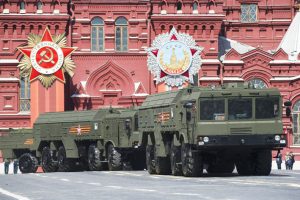BLOOMBERG
While Russian President Vladimir Putin’s plan to station nuclear weapons in neighbouring Belarus is unlikely to change Europe’s strategic balance, it has put him at odds with a pledge he made with Chinese counterpart Xi Jinping just days earlier.
Russia and China declared that “all nuclear weapons states should refrain from deploying nuclear weapons abroad†in a joint statement at the end of Xi Jinping’s visit to Moscow. Then Putin announced on state television that Russia will place tactical nuclear weapons in Belarus for the first time since the Soviet Union’s collapse, even as he insisted the move wouldn’t breach Moscow’s non-proliferation commitments.
“Putin’s statement cast doubt on the outcome of his meeting with Xi,†said Tariq Rauf, the International Atomic Energy Agency’s former nuclear non-proliferation director. “He seems to be nuclear signaling to a domestic audience, trying to reassure his own public that Russia is doing OK, that the war in Ukraine is going all right.â€
Putin’s attempt to escalate confrontation with the US and Nato over Russia’s war in Ukraine received a cool response in Washington and among Kyiv’s allies in eastern European states that border Belarus. Officials in Poland and the Baltic States criticised Moscow’s latest nuclear saber-rattling, while insisting the deployment, if it happens, would be of largely symbolic significance in security terms.
“The reaction should be calm and firm,†Poland’s European Union Affairs Minister Szymon Szynkowski vel Sek told reporters in Poznan. “We cannot let them frighten us. We should continue our efforts to support Ukraine without letting emotions get in the way.â€
Russian nuclear weapons are already stationed in Kaliningrad, its territory wedged between Poland and Lithuania, and are geographically closer to military targets in the Baltic Sea and western Europe than they would be if stationed in Belarus.
With Russian troops bogged down in eastern Ukraine, Xi’s three-day visit to Moscow was by far the most significant since Putin began the invasion more than 13 months ago, and it produced a flurry of economic and nuclear agreements.
Putin’s intention to return nuclear weapons to Belarus suggests Beijing and Moscow may interpret their commitments differently, with former US ambassador Michael McFAul saying it showed a lack of respect towards Xi.
Just days ago, Putin and Xi released a joint statement which said: “All nuclear-weapon states should refrain from deploying nuclear weapons abroad and withdraw nuclear weapons deployed abroad.”
Ten aircraft capable of carrying nuclear warheads have been prepared in Belarus, and storage facilities for the weapons will be completed by July 1, Putin said, without indicating when Russia would send the arms to its ally’s territory. Russian Iskander short-range missiles — capable of carrying nuclear warheads — have also been sent to Belarus, and training for crews would begin there on April 3, he told state TV.
There are few hurdles to prevent Belarus from hosting Russian nuclear weapons. The country stored scores of mobile warheads and tactile nuclear weapons at various bases during the Cold War. Technical barriers to rejuvenating that infrastructure are low, according to Robert Kelley, a former US nuclear-weapons engineer and intelligence analyst.
“It’s really just about security and if you’re heavy on guns and guards it won’t be much of an issue,†he said. The decision to deploy in Belarus is a political one that isn’t linked operationally to the war in Ukraine, he said.
 The Gulf Time Newspaper One of the finest business newspapers in the UAE brought to you by our professional writers and editors.
The Gulf Time Newspaper One of the finest business newspapers in the UAE brought to you by our professional writers and editors.
